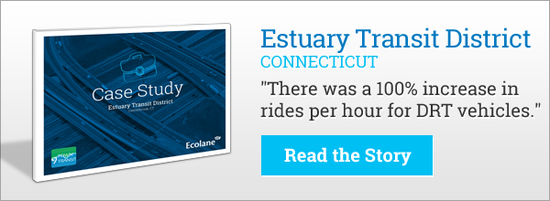The advent and continuing growth of technology in buses and transit vehicles, such as the use of mobile data tablets, has vastly improved the precision of scheduling, the ease of communications, and vehicle safety.
Mobile data tablets (MDTs) are commercially-available electronic tablets which have been converted for use as data terminals for transit vehicles. They are designed to stay connected through a cellular network to the transit scheduling server and update throughout the day with trip information.
The Convenience of Route Scheduling with MDTs
With Mobile Data Tablets, there is no need for complex wiring since the power connection is all that is needed. The best MDT setups allow for easy transfer from vehicle to vehicle, as well. The driver simply logs in from whichever vehicle they’re operating, and the data displayed for their personal route is called up.
The MDT software uses GPS systems to feed vehicle location information back into the core scheduling system in real time, monitoring stops accuracy, vehicle speed, and other driver activity. It can also provide turn-by-turn directions to drivers. The data tablet is the hub of two-way and multichannel communication on the vehicle. The most mature MDT software will update drivers’ passenger manifests in real time, incorporating driver performance to make decisions on the best scheduling solutions.
The software supplied with the MDTs can display for every stop the vehicle makes. Many systems can also be used to issue mobile app alerts, text messages or phone notifications to passengers of an impending pickup, since the system will know where the vehicle is and how many stops remain before picking up that passenger.
Aiding Transit Dispatch
The Mobile Data Tablet is the ultimate aid to transportation dispatching. A dispatcher’s ability to track the location of an entire fleet of vehicles and communicate back and forth with vehicle operators is helpful for the organizations responsible for transportation services. Even more essential is the ability for the MDT to be able to communicate directly with the scheduling server as it’s providing automated support to the office operations in real time. The result is that the system can actually improve the predicted efficiency on the day of service over what was expected.
With the efficiency pickup also comes additional safety features. Since dispatch knows where drivers are at any point, they can monitor speed violations as well as know where to send emergency services when needed. The best MDT solutions also will sense vehicle movement and lock out drivers from interacting with the dispatching software unless the vehicle is at a stop, discouraging distracted driving.
Mobile data tablets technology has made great strides. Pairing MDTs with robust and real-time scheduling systems makes them indispensable to the efficient and transparent customer service that customers demand.
About the Author:
 Kevin Dow is our Project Support Office Administrator. He has a proven record of project management in the public transportation industry and was recruited in 2013 by Ecolane to extend the level of services provided to the company’s client base. His background in education, non-profit agencies, technology procurement, standards, and policies make Kevin a valuable resource to further the objectives of the organization. His responsibilities focus on the evaluation and management of the implementation process for Ecolane, regional and local staff training, identifying added value initiatives, and increasing Ecolane's commitment to providing leading, industry client satisfaction.
Kevin Dow is our Project Support Office Administrator. He has a proven record of project management in the public transportation industry and was recruited in 2013 by Ecolane to extend the level of services provided to the company’s client base. His background in education, non-profit agencies, technology procurement, standards, and policies make Kevin a valuable resource to further the objectives of the organization. His responsibilities focus on the evaluation and management of the implementation process for Ecolane, regional and local staff training, identifying added value initiatives, and increasing Ecolane's commitment to providing leading, industry client satisfaction.

About the Author
Kevin Dow
Read Kevin's blog articles for perspective, opinion and information on transit and paratransit issues.
%20(200%20x%20100%20px).png)
